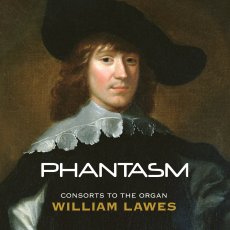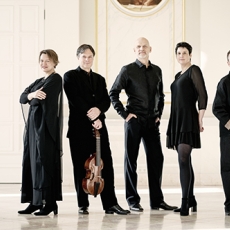Phantasm - Lawes: Consorts to the Organ - International Record Review
Some music really does deserve the epithet of ‘Baroque'. Such are William Lawe's brutally beautiful consorts for viol and organ, written between 1636 and 1639 while the composer was in the service of Charles I and which Phantasm founder Laurence Dreyfus considers the ‘pinnacle' of Lawes achievement.
Lawes (1602-45) was already working for the court when Charles I officially appointed him ‘musician in ordinary for the King's Lutes, Viols and Voices' in 1635.
A master of vocal and chamber music as well as music for dance and the theatre, Lawes probably intended these unusual works for performance in the King's Privy Apartments.
The multi-award winning viol consort Phantasm, whose recordings of the consort music of Purcell, Byrd, Gibbons and John Ward have been much lauded, is perhaps the ideal ensemble for music so rich in dissonance, unwieldy counterpoint and innovative use of homophonic techniques. Currently Consort-in-Residence at Magdalen College, Oxford, Phantasm features the talents not only of Dreyfus but established soloists such as Jonathan Manson and Markku Luolajan-Mikkola; here its forces are enhanced by the keyboard talents of Daniel Hyde, Informator Choristarum, Organist and Fellow in Music at Magdalen College.
From the Fantazy's awkward point of imitation (the central building-block of a fantasy during this period) through the ‘fake' cantus firmus of On the Playnesong to the tension-filled lightness of the Aire, the opening Set a 5 in G minor provides both overture and microcosm for the recording as a whole. Here Phantasm seizes on the rough textures punctured by dissonances to really bring not just the music but what must have been a restless, tormented temperament to life.
The same can equally be said of the ‘grotesque' opening of the Fantazia in the Set a 5 in A Minor; the Set a 5 in C minor's Paven on Downland's Lachrymae, which Dreyfus considers Lawes's masterpiece; the bucolic sweetness of the Paven from the Set a 5in C; the precipitous, dramatic Fantazy of the Set a 6 in F; and the immense calm and freedom of the Inominy from the Set a 6 in B flat, an In nomine which brings the recording to a deliciously restful close after so much strife.
As it is to be expected from Linn, the recording in St Martin's Church, East Woodhay, Hampshire is bright, detailed not overly resonant: perfect for music of such extraordinary emotional range.

